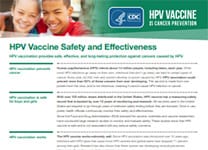At a glance
HPV vaccination provides safe, effective, and long-lasting protection against cancers caused by HPV.

HPV vaccination is very safe
Over 15 years of monitoring and research during the vaccination program have continued to show that HPV vaccination is safe.
More than 135 million doses of HPV vaccines have been distributed since they were licensed. Data continue to show the vaccines are safe and effective.
As with all approved vaccines, CDC and FDA closely monitor the safety of HPV vaccines. Any detected safety concerns are reported to health officials, healthcare professionals, and the public.
HPV vaccine doesn't cause fertility problems
Not getting HPV vaccine leaves people at risk for HPV cancers and precancers (abnormal cells that can lead to cancer).
- People who develop a cancer caused by HPV will need treatment that can sometimes limit their ability to have children, such as a hysterectomy (for women), chemotherapy, or radiation.
- Treatment for cervical precancer could also put women at risk for problems with their cervix, which can sometimes cause preterm delivery.
HPV vaccination prevents cancer-causing infections & precancers
HPV infections and cervical precancers have dropped since 2006, when HPV vaccines were first used in the United States.
- Among teen girls, infections with HPV types that cause most HPV cancers and genital warts have dropped 88 percent.
- Among young adult women, infections with HPV types that cause most HPV cancers and genital warts have dropped 81 percent.
- Among vaccinated women, the percentage of cervical precancers caused by the HPV types most often linked to cervical cancer has dropped by 40 percent.
Long-lasting protection
The protection provided by HPV vaccines lasts a long time. People who received HPV vaccines were followed for at least about 12 years, and their protection against HPV has remained high with no evidence of decreasing over time.

